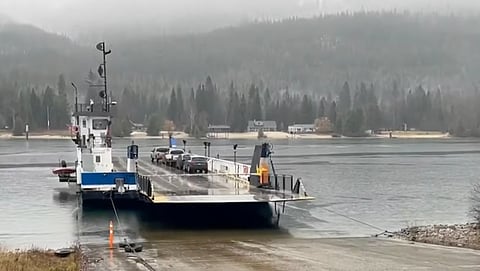

Residents of remote towns in British Columbia's Kootenay region have been left scrambling following revelations that strike action taken by the BC General Employees Union has expanded, and will soon impact the ferry services that they rely on.
Effective 6:30 a.m. on Monday, January 6, 2025, the Glade and Harrop cable ferries will see their schedules reduced by 90%.
The services, run by Western Pacific Marine's Kootenay Lake Ferry Division, are a lifeline for the towns of Harrop, Procter, and Glade, all of which are only accessible via ferry. The former two are located 20km northeast of Nelson while the former is 20km to the southwest.
In a statement posted to their website, the company announced that they were "working with the community to determine a revised schedule that is in accordance with the Labour Relations Board ruling," noting that, "creating a limited and fixed schedule for the cable ferries is complicated."
In late December, the Labour Relations Board agreed to allow BCGEU employees to strike, but maintained that the cable ferries were an essential service. It was decided that the ferry to Harrop would run eight round trip crossings per day, and the Glade ferry would run 16.
A copy of the schedule obtained by the Western Standard shows that the services will depart their respective communities in the morning, and return in the evening.
According to Lee Vincent of the Glade Ferry Committee, however, this is far from ideal. She explained to the Western Standard that the ferry only fits eight vehicles, meaning there won't be enough space to accommodate everyone who needs to catch a particular sailing.
"People are going to have to walk on and leave their vehicles on the other side, which is an unsafe thing to do," she said. "People are going to have to talk to their employers to see if they can adjust their work schedule. It's putting the livelihoods of the residents in the community at risk."
Vincent went on to note that a lot of people, such as shift workers, will be forced to take their own watercraft across the river to get where they need to be.
"If somebody's coming off a shift at 2:30 in the morning," she said, "they're gonna run a tin boat or paddle a paddle board or a kayak across in the dark, in the cold, in the middle of winter to get home."
On-demand services will still run, but they will be limited to those who required medical care, students attending classes and their parents, school staff, first responders and law enforcement personnel, snow removal vehicles, and those making regularly scheduled deliveries to the Procter General Store.
Those hoping to utilize the on-demand services will have to fill out a "boarding pass" indicating which exempt category they fall under.
Vincent said the residents were filled with "anxiety and anger," noting that they felt "incredible disappointment that the community was being used as a pawn and leverage to address a disagreement between labour management and the BC government."
When asked whether anyone in power had reached out or spoken about the plight of residents, she said the community had "heard nothing."
